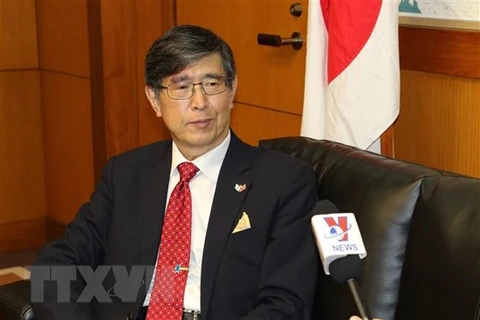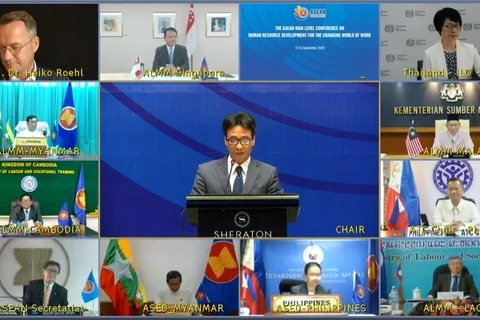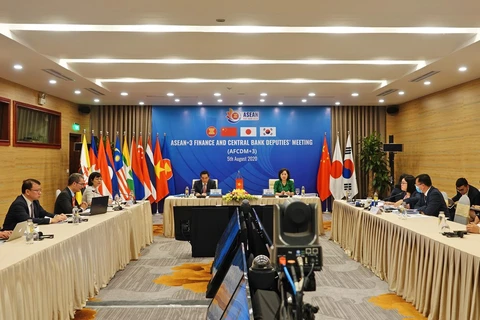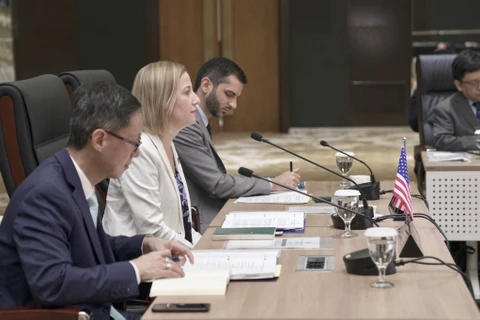 Vietnam and Japan co-chair the 23rd ASEAN Finance Ministers’ and Central Bank Governors’ Meeting Plus Three (AFMGM +3) which is held virtually on September 18 (Photo: VietnamPlus
Vietnam and Japan co-chair the 23rd ASEAN Finance Ministers’ and Central Bank Governors’ Meeting Plus Three (AFMGM +3) which is held virtually on September 18 (Photo: VietnamPlus Hanoi (VNA) – Prospects for regional and global economic development was one of the important contents discussed at the 23rd ASEAN Finance Ministers’ and Central Bank Governors’ Meeting Plus Three (AFMGM +3) which was held virtually on September 18.
This was the most important meeting in a series of ASEAN+3 financial cooperation events co-chaired by Vietnam and Japan this year.
The meeting saw the attendance of the Finance Ministers and Central Bank Governors from ASEAN+3 nations, ASEAN Secretary-General Dato Lim Jock Hoi, President of the Asian Development Bank (ADB) Masatsugu Asakawa, and representatives from the International Monetary Fund (IMF) and the ASEAN+3 Macroeconomic Research Office (AMRO).
Strategic orientations
At the meeting, the Financial Ministers and Central Bank Governors from member states of the Association of Southeast Asian Nations (ASEAN) and their Chinese, Korean and Japanese counterparts, along with leaders of international financial institutions, had a dialogue on global and regional macroeconomic policies as well as measures to cope with the COVID-19 pandemic.
The Finance Ministers and Governors also considered the implementation of cooperation initiatives under the ASEAN+3 financial cooperation process and strategic directions and new initiatives of the process, and adopted a joint statement of the meeting.
The participants shared views on risks and challenges posed by the COVID-19 pandemic to the global and regional economies as well as measures and policies regional economies have been implementing to curb the health crisis and restore economic growth, including a package of fiscal, monetary, and regulatory solutions to the financial system.
According to the IMF’s forecast, the global economic is likely to contract by 4.9 percent in 2020 while the Asian economy is predicted to shrink by 1.6 percent.
 The 23rd ASEAN Finance Ministers’ and Central Bank Governors’ Meeting Plus Three (AFMGM +3) in Hanoi on September 18 (Photo: VietnamPlus)
The 23rd ASEAN Finance Ministers’ and Central Bank Governors’ Meeting Plus Three (AFMGM +3) in Hanoi on September 18 (Photo: VietnamPlus) They also mentioned that in the context of increasingly interdependent economies, the impact of the pandemic on global supply chains is even more severe.
This creates a requirement for financial and monetary management agencies to promptly and effectively formulate and issue measures and macroeconomic policies, thus increasing the resilience of economies to shocks and maintaining the stability and integrity of the financial system, they stressed.
The participants emphasised the importance of financial cooperation for countries to strengthen their capacity to respond to the impact of the pandemic and support economic recovery in a sustainable manner.
ASEAN+3 financial cooperation initiatives
Vietnamese Minister of Finance Dinh Tien Dung said the COVID-19 pandemic could not prevent cooperative activities among regional countries.
According to a report presented, working groups are still making ongoing efforts to pursue directions set by Finance Ministers and Governors of Central Banks, and remarkable results have been achieved, especially the improvements to the operational efficiency of the ASEAN 3 Macroeconomic Research Office (AMRO), the signing of the revised Chiang Mai Initiative Multilateralisation (CMIM) Agreement, the implementation of activities under the Asian Bond Markets Initiative (ABMI), and discussions on new cooperation initiatives in the future.
The participants also approved important technical issues, including amending the CMIM Agreement, which is important for tightening cooperation and increasing mutual support among countries in the context of the regional economy facing many difficulties and uncertainties.
They also appreciated AMRO’s efforts as an international organisation in the past time, actively implementing macroeconomic monitoring activities, providing assessments and analysis of the impacts caused by the COVID-19 pandemic on the region, and proposing policy recommendations to ensure a stable macroeconomic and financial situation in the region.
The attendees also acknowledged and highly valued the implementation and results of ABMI’s working groups on researching improvements to the environment to attract investors, developing new investment tools, perfecting the legal framework, and developing infrastructure for the bond market as well as implementing technical assistance programmes to develop the domestic bond markets of member economies.
To enhance regional economic and financial stability, the participants welcomed the implementation of new initiatives within the framework of the Strategic Orientation of the ASEAN+3 financial cooperation process.
The Ministers of Finance and Governors of Central Banks approved a joint statement of the meeting with high consensus.
 The Finance Ministers and Central Bank Governors adopt a joint statement of the meeting (Photo: VietnamPlus)
The Finance Ministers and Central Bank Governors adopt a joint statement of the meeting (Photo: VietnamPlus) The group’s member nations also appreciated Vietnam and Japan organising and chairing events in 2020, and hoped that the 24th meeting will be successfully held in Tbilisi, Georgia, under the co-chair of Brunei and the Republic of Korea in 2021./.
























